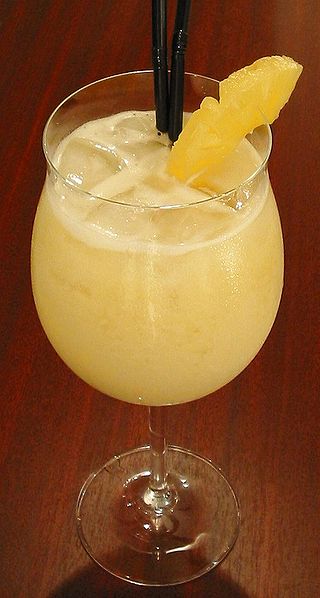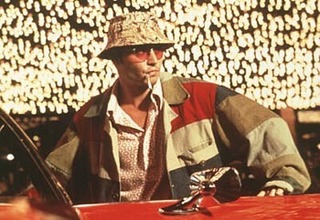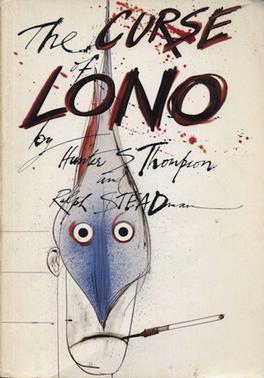
Gonzo journalism is a style of journalism that is written without claims of objectivity, often including the reporter as part of the story using a first-person narrative. The word "gonzo" is believed to have been first used in 1970 to describe an article about the Kentucky Derby by Hunter S. Thompson, who popularized the style. It is an energetic first-person participatory writing style in which the author is a protagonist, and it draws its power from a combination of social critique and self-satire. It has since been applied to other subjective artistic endeavors.

Hunter Stockton Thompson was an American journalist and author who founded the gonzo journalism movement. He rose to prominence with the publication of Hell's Angels (1967), a book for which he spent a year living and riding with the Hells Angels motorcycle club to write a first-hand account of their lives and experiences.

The piña colada is a cocktail made with rum, cream of coconut or coconut milk, and pineapple juice, usually served either blended or shaken with ice. It may be garnished with either a pineapple wedge, maraschino cherry, or both. The drink originated in Puerto Rico.

Oscar "Zeta" Acosta Fierro was a Mexican-American attorney, politician, novelist and activist in the Chicano Movement. He was most well known for his novels Autobiography of a Brown Buffalo (1972) and The Revolt of the Cockroach People (1973), and for his friendship with American author Hunter S. Thompson. Thompson characterized him as a heavyweight Samoan attorney, Dr. Gonzo, in his 1971 novel Fear and Loathing in Las Vegas. Acosta disappeared in 1974 during a trip in Mexico and is presumed dead.

The Caribe Hilton is located in San Juan, Puerto Rico, and is owned by Park Hotels & Resorts and managed by Hilton Worldwide.

Bruce Robinson is an English actor, director, screenwriter and novelist. He wrote and directed Withnail and I (1987), a film with comic and tragic elements set in London in the late 1960s, which drew on his experiences as a struggling actor, living in poverty in Camden Town.
William Joseph Kennedy is an American writer and journalist who won the 1984 Pulitzer Prize for his novel Ironweed.

Raoul Duke is the partially fictionalized author surrogate character and sometimes pseudonym used by Hunter S. Thompson as the main character and antihero for many of his works. He is perhaps best known as the narrator for his 1971 autobiographical novel Fear and Loathing in Las Vegas. The book was originally written under the name Raoul Duke. The character wears a bucket hat and yellow tinted aviator glasses.

Juan Eugenio Serrallés Colón (1836–1921) was the founder of Hacienda Mercedita in Ponce, Puerto Rico, and what was to become Destileria Serralles, producers of "Don Q", a brand of Puerto Rican rum.
"The Kentucky Derby Is Decadent and Depraved" is a seminal sports article written by Hunter S. Thompson on the 1970 Kentucky Derby, which first appeared in an issue of Scanlan's Monthly in June of that year. The article marked the first appearance of what became known as "gonzo journalism", the style that Thompson came to epitomize through the 1970s.
Prince Jellyfish is an unpublished novel by American journalist and author Hunter S. Thompson.

The Curse of Lono is a book by Hunter S. Thompson describing his experiences in Hawaii in 1980. Originally published in 1983, the book was only in print for a short while. In 2005 it was re-released as a limited edition. Only 1000 copies were produced, each one being signed by the author and artist Ralph Steadman.The book is now available as a smaller hardcover edition.
The Rum Diary may refer to:

Fear and Loathing in Las Vegas is a 1998 American black comedy adventure film adapted from Hunter S. Thompson's 1971 novel of the same name. It was co-written and directed by Terry Gilliam, and stars Johnny Depp and Benicio del Toro as Raoul Duke and Dr. Gonzo, respectively. The film details the duo's journey through Las Vegas as their initial journalistic intentions devolve into an exploration of the city under the influence of psychoactive substances.

Fear and Loathing in Las Vegas: A Savage Journey to the Heart of the American Dream is a 1971 novel in the gonzo journalism style by Hunter S. Thompson. The book is a roman à clef, rooted in autobiographical incidents. The story follows its protagonist, Raoul Duke, and his attorney, Doctor Gonzo, as they descend on Las Vegas to chase the American Dream through a drug-induced haze, all the while ruminating on the failure of the 1960s countercultural movement. The work is Thompson's most famous book, and is noted for its lurid descriptions of illicit drug use and its early retrospective on the culture of the 1960s. Thompson's highly subjective blend of fact and fiction, which it popularized, became known as gonzo journalism. Illustrated by Ralph Steadman, the novel first appeared as a two-part series in Rolling Stone magazine in 1971 before being published in book form in 1972. It was later adapted into a film of the same title in 1998 by director Terry Gilliam, starring Johnny Depp and Benicio del Toro, who portrayed Raoul Duke and Dr. Gonzo, respectively.

Gonzo Papers, Vol. 3: Songs of the Doomed: More Notes on the Death of the American Dream is a book by the American writer and journalist Hunter S. Thompson, originally published in 1990. This third installment of The Gonzo Papers is a chronologically arranged selection of stories, letters, journals and reporting, allowing readers to see how Thompson's brand of "new journalism," also termed Gonzo journalism, has evolved over the years. It is a collection of Dr. Thompson's essays and articles. This collection is mostly made up of pieces from the Reagan Era, but there are also some older stories, including excerpts from his unfinished first novel, "Prince Jellyfish", which is still unpublished, and The Rum Diary, which was not published on its own until 1998.

Infinitum Nihil is an American film production company, founded by Johnny Depp. The company is run by Depp's sister Christi Dembrowski. Depp founded the company in 2004 to develop projects where he will serve as actor and/or producer.
Bibliography of works by American author and journalist Hunter S. Thompson.

The Rum Diary is a 2011 American comedy-drama film written and directed by Bruce Robinson, based on the 1998 novel of the same name by Hunter S. Thompson. The film stars Johnny Depp, Aaron Eckhart, Michael Rispoli, Amber Heard, Richard Jenkins, and Giovanni Ribisi.

Hacienda Mercedita was a 300-acre (120 ha) sugarcane plantation in Ponce, Puerto Rico, founded in 1861, by Juan Serrallés Colón. Today Hacienda Mercedita no longer grows sugarcane and its lands are instead used for growing mangoes, grasses, landscape plants and palms, coconut palms, bananas, and seeds.















